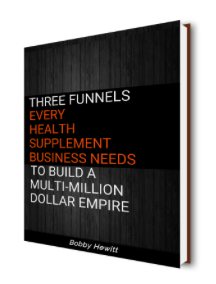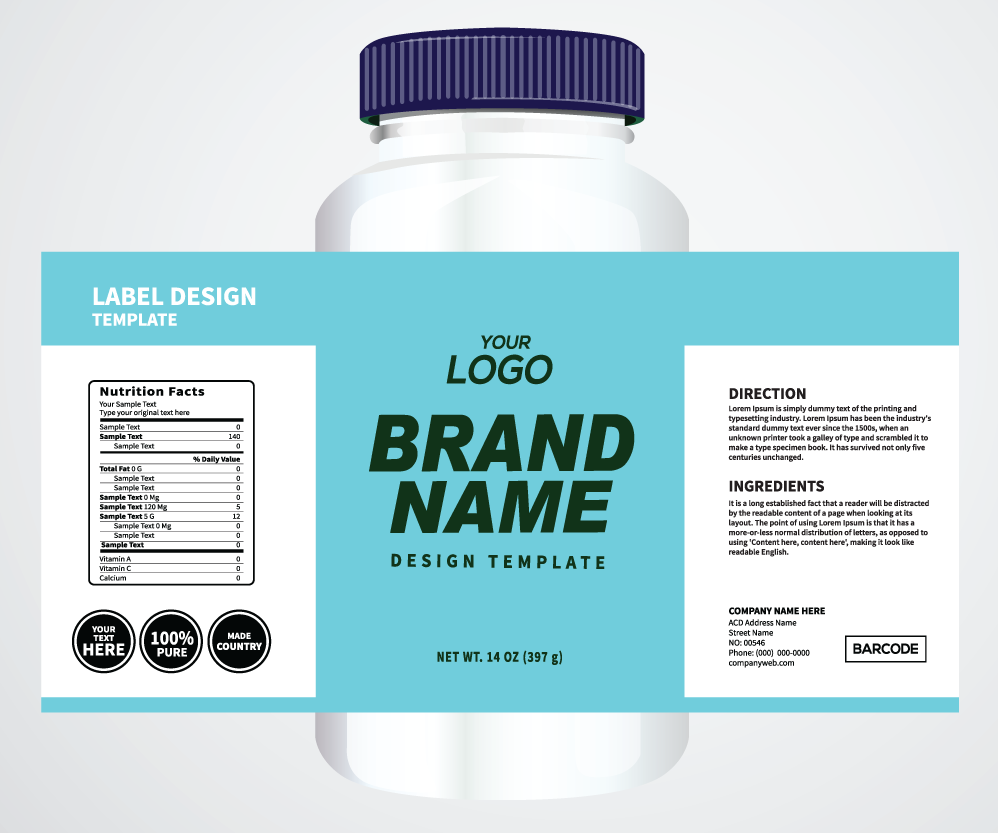
Direct to consumer supplement businesses bypass retail stores and middlemen like Amazon. They sell directly to consumers online.
Allowing the brand to increase margins and control everything.
Including the brand experience, the visitor traffic and more importantly all the marketing.
Some interesting digitally-native, Direct to consumer supplement brands for dietary supplements that we have our eye on include:
One advantage digital-first brands like those and others like them have is a single focus approach.
When each of those brands started, they were forced by necessity to focus on one single product.
Embracing the principle of this bootstrapped focus, is part of what made them successful.
Focus is the key.
But not just focus on one singular product alone.
Rather a series of ones.
One funnel strategy. (so you can focus.)
One traffic source. (so you can keep the attribution data super clean.)
One customer avatar. (so you can speak directly to a specific person.)
Along with one product. (so you can test different offers with the same product.)
Every Direct To Consumer Supplement Brand Starts Somewhere
As marketers we envy companies like Ritual Vitamins.
We marvel at the clean design of the packaging.
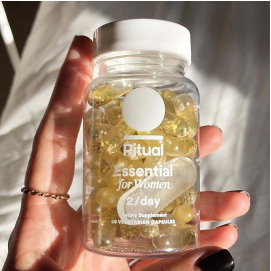

And think if our brand only had the modern look of the Elysium website that we’d be crushing it.
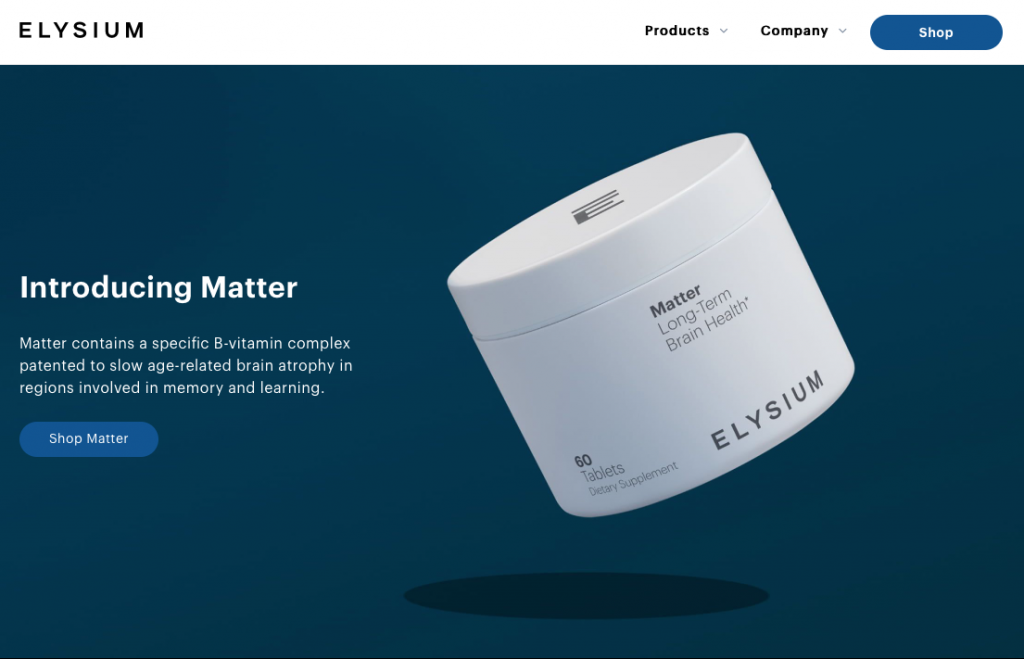
But that’s not the case at all.
What many don’t realize is that when Ritual first launched it had just one product, a multi-vitamin.
And it focused on only one market, women.
They kept it very simple and tightly focused.
Fatty15 goes one step further and has only ONE ingredient.
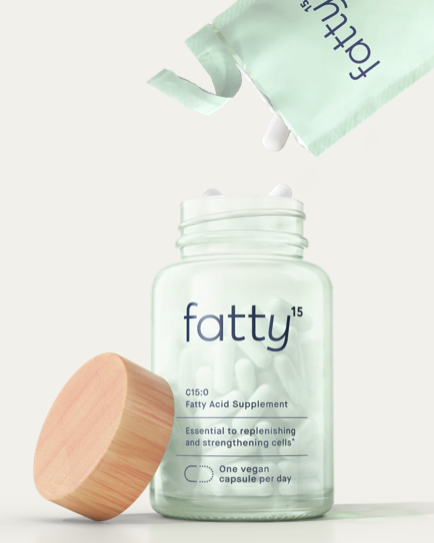
Focusing on a very narrow but deep vertical gives direct-to-consumer supplement brands enormous potential over marketing.
Retail stores and online big box distributers, like Amazon, all limit the way brands can market and sell to consumers.
Direct-to-consumer marketing lets brands write their own ticket to faster growth.
That is, as long as they have the budget to test enough to learn how to acquire customers for less than the lifetime value of those buyers.
Because acquiring customers is the key.
And the best way for DTC brands to gain that edge of customer acquisition, is through direct response marketing.
But direct response marketing is where most brands struggle.
The main problem with direct response for these more polished supplement brands is that they resist embracing it.
Mostly because they see the market as two-sided.
On one side there’s the clean brand marketing.
And the other there’s the slimy heavy-handed selling. (At least that’s their opinion of it.)
But there is a middle ground between the two.
That is, if you pick and choose your marketing tactics carefully.
Direct to Consumer Supplement Brand and Direct Response Marketing
There are many direct response marketing tactics that work.
One such tactic is storytelling.
Direct response copywriting has used story telling for years in the form of leads.
Leads come from the phrase “lead-in” or “lead paragraph” which is the first 300 – 500 words of a long form sales letter.
The job of the lead is to lead the reader into the letter.
It’s an extension of the headline and gets them reading.
In contrast to focusing on just features and benefits as the big brands like Garden of Life Supplements does.
The direct response marketing approach here is to put the customer at the heart of the story.
Many supplement brands focus too much on the founder’s story.
Or they lead with the science or the unique mechanism and ingredients behind the product first.
With a direct response story telling approach you lead with the customer’s journey.
Meeting them where they are in their set of values and belief system.
Here’s an example that leads with the values of the target market.
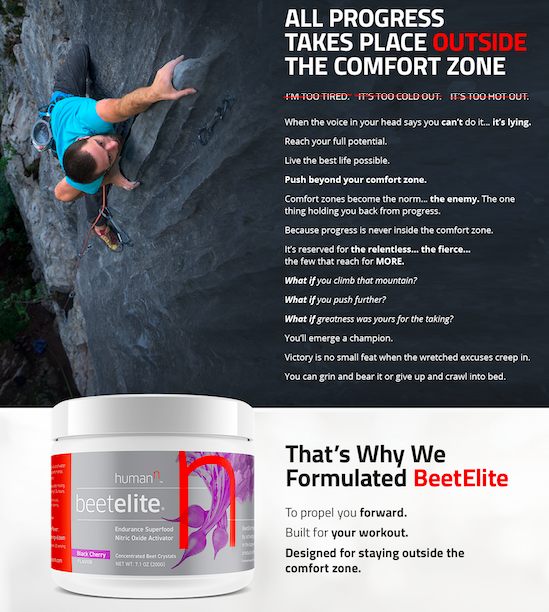
Notice how the beginning, or lead, is aspirational.
Here’s the headline and the lead copy.
ALL PROGRESS TAKES PLACE OUTSIDE THE COMFORT ZONE
Above is the lead copy for a hybrid direct response / branding landing page.
When the voice in your head says you can’t do it… it’s lying.
Reach your full potential.
Push beyond your comfort zone.
Comfort zones become the norm… the enemy. The one thing holding you back from progress.
Because progress is never inside the comfort zone.
It’s reserved for the relentless… the fierce…
the few that reach for MORE.
What if you climb that mountain?
What if you push further?
What if greatness was yours for the taking?
You’ll emerge a champion.
Victory is no small feat when the wretched excuses creep in.
You can grin and bear it or give up and crawl into bed.
This example straddles that middle ground between brand marketing and direct response marketing.
You can see where this lead-in approach comes into the conversation with the customer first.
Not the product like traditional eCommerce.
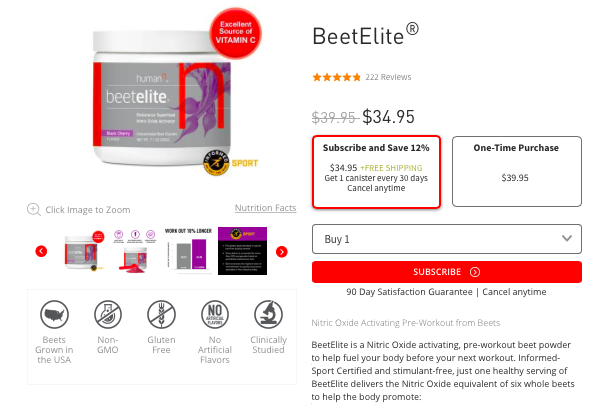
It also is focuses on selling to one specific customer avatar. The cross fit, driven type of weekend athlete.
This aspirational approach does not start with the product or the ingredients as a typical supplement brand marketing would.
The product and call to action is not even above the fold.
That’s a good thing. Most would see that as a violation of best practices.
And it is, but it works because selling a supplement is a complex sale.
Remember people don’t buy supplements like they buy other products.
The supplement buying forces of Desire, Hope, Trust and Belief are at play here and as with any complex sale, they often outweigh best practices.
This direct response lead approach is uncomfortable for companies like Garden of Life.
And that’s the opportunity here.
It’s a chance for the smaller direct to consumer brands to shine.
That is if they can get over their own hang ups and embrace a bit of direct response marketing.
For some supplement brands that means embracing the idea of stories.
Stories are what sell.
The resistance is really around the idea of selling.
For some reason selling is a bad word for many big brand supplement companies.
Even for the direct to consumer supplement brands mentioned earlier.
Many CMOs feel they can only sell with science.
And compliance guidelines have put them in a state of fear.
The true act of selling is all about helping someone.
Which is why stories are at the core of selling.
Stories inspire an emotional reaction that leads to a sale.
If your marketing team is willing to embrace stories and lead-ins they must also accept the idea of longer pages.
More words and text that most marketers see as friction are what make these pages work.
I’m not sure why they resist this so much.
Perhaps it’s because they feel it conflicts with the brand.
Which is the next sacred cow that needs to be slain.
The thinking that “it’s off brand for us.”
One way around that line of thinking is to separate out a landing page like this from the main website.
Whereby creating a unique page for customer acquisition ad campaigns.
That way your product detail page are still “on brand”
As you may know, the way a supplement business wins is through customer acquisition.
He who can afford to spend the most to acquire a customer wins.
If a hybrid direct response / branding page or a mini site can accomplish that better than an eCommerce product detail page then let the better tool for the job win.
In the end isn’t it really about helping change peoples lives?
Providing an alternative to big Pharma and promoting a healthy lifestyle?
Any brand can do that better when they are acquiring more customers.
In fact that’s the only way a brand can do that at all.
Discover the 3 funnels that can help your health supplement business succeed.
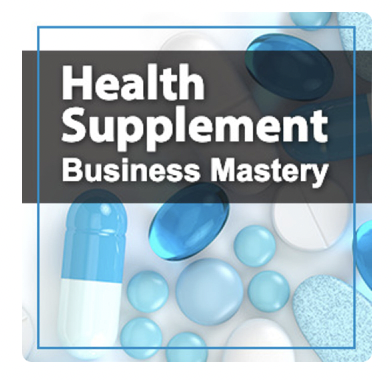
Listen to the Health Supplement Business Mastery Podcast for for dietary supplement entrepreneurs and marketers.
